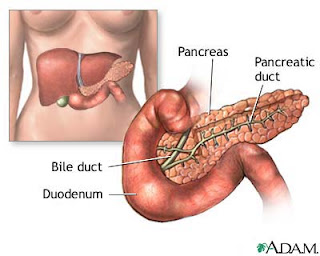Diabetic gastroparesis is a kind of damage to the nerves that control the automatic muscular activity of the stomach. Therefore, the passage of food through the digestive tract is slowed down. It's a common complication of Type 2 diabetes that can cause many mysterious... but easily treatable... health problems.
Gastroparesis, meaning reduced stomach emptying, is a kind of mild paralysis of the digestive tract. When the vagus nerve is injured by long exposure to uncontrolled blood sugar levels, it conducts messages from the central nervous system more and more slowly. Diabetics with gastroparesis have severe acid reflux symptoms, and even a diminished appetite. Eventually, the passage of food from the stomach to the small intestine and the colon can literally take days, leading to:
as well as unpredictable blood sugar levels. Because the normal passage of food into the gut is slowed down, meaning there is a delay in absorption of food, this slows down conversion of food to glucose or sugar.
Normally food is squeezed out of the stomach in a short time... in a couple of hours. If there is gastroparesis, stomach emptying is variable and food usually remains in the stomach for days.
The way a doctor detects damage to the vagus nerve is by monitoring your heart rate as you hold your breath. If your heart rate goes down... not up... then chances are that the nerve is not working as it should. Nowadays it is possible to get a pacemaker for your stomach as well as your heart, but many Type 2 diabetics who suffer the symptoms of gastroparesis are able to bring them back under control with a single, simple, daily practice:
Test, test, test your blood sugar levels, and keep them under control.
When blood sugar levels are kept under good control for weeks, months, and years, damage to nerves reverses itself. In the meantime, it is possible to control symptoms by eating smaller meals more often, and by taking the digestive enzymes bromelain (or eating pineapple) or papain (or eating pineapple) with a meal, especially when you eat meat.
Your doctor may advise you to delay your mealtime insulin injection until 30 to 60 minutes following your meal.
Various types of treatment, such as antibiotics, have been tried for gastroparesis... results have been variable. In recent times, this condition has been treated (by specialists) by injecting botulinum toxin into the muscles at the outlet of the stomach. So far early results of this procedure are promising.
The most important aspect of controlling your Type 2 diabetes is always being aware of your blood sugar levels.




No comments:
Post a Comment